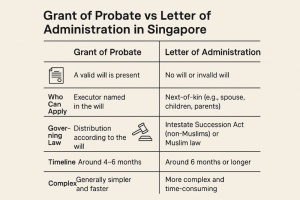 When someone passes away in Singapore, their estate — such as property, bank accounts, investments, and other assets — must be distributed according to the law. Two main legal processes allow this to happen: a Grant of Probate or a Letter of Administration.
When someone passes away in Singapore, their estate — such as property, bank accounts, investments, and other assets — must be distributed according to the law. Two main legal processes allow this to happen: a Grant of Probate or a Letter of Administration.
Though both processes empower someone to manage the estate, they apply in different situations, with distinct requirements and timelines. This guide provides a clear explanation of Grant of Probate vs Letter of Administration in Singapore, helping you understand which one applies and what steps to take.
What is a Grant of Probate?
A Grant of Probate is a legal document issued by the Family Justice Courts when the deceased has left behind a valid will. It gives the executor named in the will the authority to administer the estate.
Once granted, the executor will:
-
Collect and safeguard all assets
-
Pay off debts, taxes, and liabilities
-
Distribute the remaining assets to the beneficiaries according to the will
This process is typically faster and more straightforward compared to cases without a will.
What is a Letter of Administration?
A Letter of Administration is required when the deceased did not leave a will or when the will is found to be invalid.
In such cases, the court appoints one or more administrators — typically the next-of-kin — to manage and distribute the estate. For non-Muslims, distribution follows the Intestate Succession Act, while for Muslims, assets are distributed according to Muslim inheritance laws.
This process is often more complex and may take longer because:
-
The rightful administrator must be identified
-
Consent from other family members may be needed
-
Additional documentation and verification are often required
Key Differences Between Grant of Probate and Letter of Administration
| Aspect | Grant of Probate | Letter of Administration |
|---|---|---|
| Existence of Will | A valid will is present | No will or invalid will |
| Who Can Apply | Executor named in the will | Next-of-kin (e.g., spouse, children, parents) |
| Governing Law | Distribution according to the will | Intestate Succession Act (non-Muslims) or Muslim law |
| Complexity | Generally simpler and faster | More complex and time-consuming |
| Typical Timeline | Around 1-2 months | Could be longer than 1-2 months |
| Common Challenges | Minimal, unless the will is contested | Identifying rightful administrator, family disputes |
Step-by-Step: Applying for a Grant of Probate
If the deceased left a will, here’s how the process generally works:
-
Confirm the Will
Ensure the will is valid and that you are the named executor. -
Gather Required Documents
Collect the original death certificate, original will, and identification documents. -
File the Application
Prepare and file the Originating Application, Supporting Affidavit, Administration Oath, and Schedule of Assets in court. -
Court Approval
The court reviews your documents, and once approved, issues the Grant of Probate. -
Administer the Estate
Collect assets, settle debts, and distribute the balance according to the will.
Step-by-Step: Applying for a Letter of Administration
If the deceased died without a will, the process is slightly different:
-
Confirm Intestacy
Verify that no valid will exists. -
Identify the Right Applicant
Determine the closest next-of-kin eligible to apply. -
Engage a Letters of Administration Lawyer
While not mandatory, legal advice helps avoid mistakes and delays. -
File the Application
Submit the Originating Summons, Supporting Affidavit, Administration Oath, and a detailed Schedule of Assets. -
Court Issues the Letter of Administration
Once granted, the administrator gains the legal authority to handle the estate. -
Manage and Distribute Assets
Collect assets, pay liabilities, and distribute according to intestacy laws or Muslim inheritance laws.
Timelines for Each Process
| Process | Typical Timeline |
|---|---|
| Grant of Probate | 1 to 2 months, faster if the estate is straightforward |
| Letter of Administration | Could be longer than 1 to 2 months, especially if complex assets are involved |
Cost of Probate vs Letter of Administration
The cost depends on the complexity of the estate and whether professional legal help is used.
-
Simple estates: $950 nett
-
Complex estates: $2,000 or more, especially for estates with incomplete asset information and minor beneficiaries.
Hiring an experienced letters of administration lawyer in Singapore is highly recommended to streamline the process and ensure compliance with court requirements.
Common Challenges
For Grant of Probate
-
Disputes over the interpretation of the will
-
Missing or unclear asset details
For Letter of Administration
-
Multiple next-of-kin disputing who should be administrator
-
Difficulty identifying or verifying assets
Why Engage a Probate Lawyer
While both processes can be done without a lawyer, engaging a probate specialist is highly beneficial:
-
Ensures accuracy in preparing and filing documents
-
Reduces risk of delays caused by incomplete or incorrect applications
-
Provides expert advice in cases involving disputes or complex estates
-
Offers peace of mind during an emotionally challenging time
Key Takeaways
-
Apply for a Grant of Probate if there is a valid will.
-
Apply for a Letter of Administration if there is no will or if the will is invalid.
-
The Grant of Probate process is generally simpler and faster.
-
Both processes require accurate documentation and strict compliance with legal requirements.
-
Engaging a probate lawyer in Singapore ensures smoother administration of the estate.
By understanding the differences between a Grant of Probate and a Letter of Administration, you can take the right steps to manage your loved one’s estate efficiently and in compliance with Singapore law.
Contact us at +6598330314 (whatsapp) for more information.
Our price list can be found here.
Related articles can be found here

